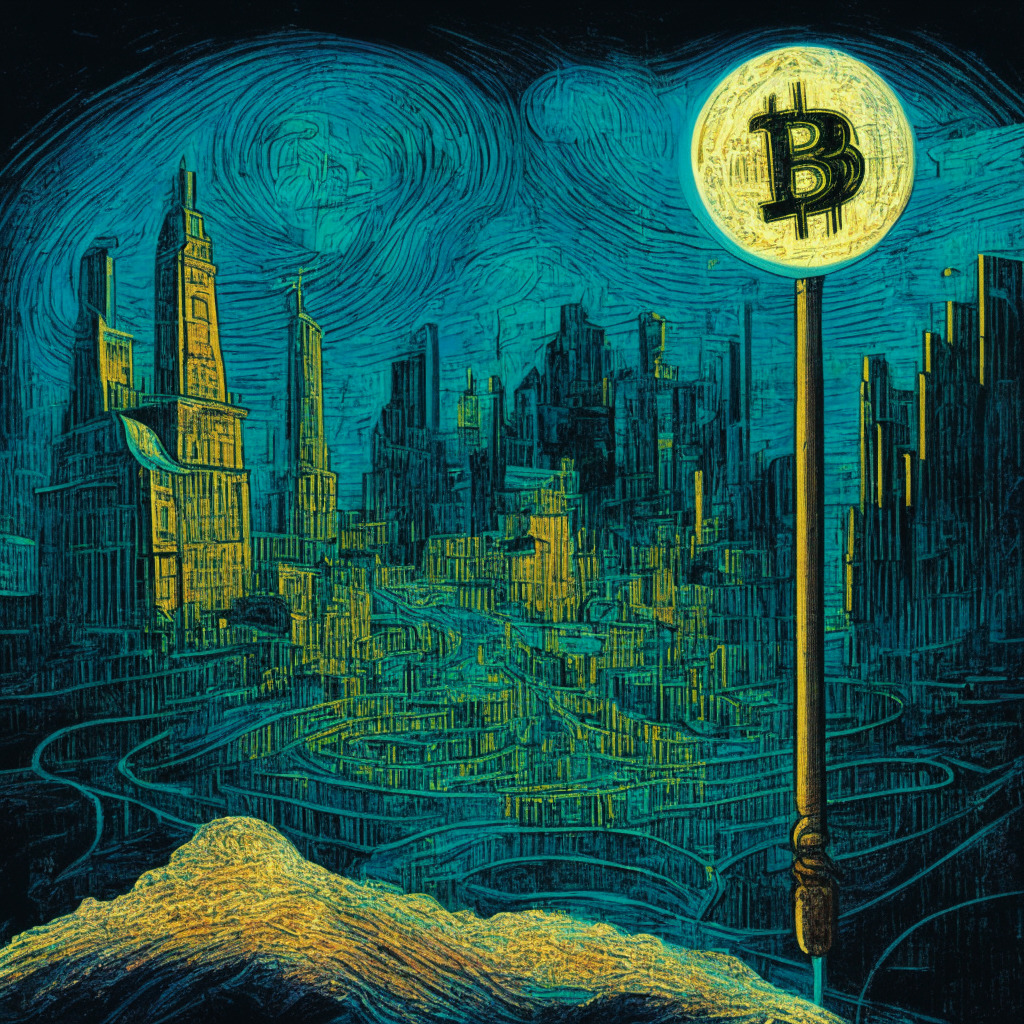Ethereum layer 2 developer, Polygon Labs, commences Polygon 2.0 ecosystem aimed at establishing an interconnected Ethereum system with high throughput and low fee transactions. This ecosystem evolution highlights the adaptability of blockchain technology but raises questions about the impacts on established contracts and practices.
Search Results for: intel
Wyoming Stablecoin: Game Changer for Federal Reserve or Risk to Monetary Stability?
“The Wyoming Stable Token Act introduces the concept of state-based unique stablecoins, raising questions about their potential to disrupt the Federal Reserve’s authority or revolutionize digital transactions. The future of such state-specific cryptocurrencies is entwined with the ongoing evolution of digital currencies.”
Unraveling Ethereum’s Market Volatility: Active Addresses Surge Amid Price Decline
“Market analysts report a significant increase in daily active Ethereum addresses, marking the second-highest in its history and indicating potential market volatility. Despite Ethereum’s price decline, escalated interest among institutional investors and its stronghold in the DeFi ecosystem are bolstering its outlook.”
Navigating the Twisty Paths of Lightning Network: Routing Attacks, Threats and Measures Against Them
Safeguarding assets from routing attacks is crucial in the crypto ecosystem, particularly for the Lightning Network. These attacks exploit network vulnerabilities for personal gain and can undermine network efficiency. However, preventive measures are in place, including network surveillance tools, diligent upgrades, diversified channels, and community participation to enhance security. Users must maintain vigilance and understand the risks and safeguards.
Deutsche Bank’s Crypto Custody: Innovative Progress or Risky Move?
“Deutsche Bank has partnered with cryptocurrency platform, Taurus, aiming to offer cryptocurrency custody to its customers. Taurus will provide custody and tokenization technology compliant with local regulations. Despite its forward-thinking approach, the volatile nature of crypto markets presents a financial risk.”
Delio’s Clash with South Korean Regulators: A Battle for Clear Crypto Laws or a Struggle for Survival?
South Korea’s Bitcoin lender, Delio, plans to sue financial regulators over an allegation of fraud and embezzlement of assets raised by the Financial Service Committee (FSC). The dispute focuses on the unclear application of laws relating to virtual asset activities, which Delio insists were unfairly implemented.
Ernst & Young’s Hefty $1.4 Billion Investment in AI: Boon or Risk for the Future of Technology?
“EY has invested $1.4 billion in AI technologies, targeting the development and launch of the EY.ai platform to aid organizations in adopting AI. The architecture is rooted in EY’s large language model, and gains extra potential through a partnership with Microsoft. The investment is also geared towards integrating AI into existing EY services.”
Navigating Climate Change: The Intersection of Blockchain and Environmental Responsibility
“The Web3 ecosystem is progressively altering the blockchain narrative through the Ethereum Merge, which transitions from energy-intensive proof-of-work consensus to a greener, environmentally friendly proof-of-stake system. This change attracts eco-conscious activists, triggers innovation in regenerative finance, and encourages blockchain-based projects to offset their carbon footprint.”
Google Cloud Partners with Web3 Startup: A New Era for Mainstream DeFi or A Risky Gamble?
“Google Cloud is partnering with Web3 startup, Orderly Network, to develop user-centric developer tools with an aim to mainstream decentralized finance (DeFi). The goal is to lower barriers preventing widespread adoption of decentralized technology amid growing interest in blockchain workloads.”
Riding The Meme-Token Wave: From шайлушай Excitement to Wall Street Memes Revolution
“The crypto market is being moved by unexpected tokens like Real Smurf Cat token (шайлушай), which has boasted a 20x rise. Meanwhile, Wall Street Memes is gaining attention with its $0.0337 presale price point, speculations of high return investments, and community rewards. These tokens are enhancing market dynamics despite their seeming randomness.”
AI Revolution or New Tech Bubble? Goldman Sachs Predicts Major Investment Shift towards AI
Goldman Sachs views the boom of Artificial Intelligence (AI) as not a bubble, but the beginning of an AI revolution. The firm predicts global AI investments to reach $200 billion by 2025, attributing this expected surge to the expansive economic opportunities offered by generative AI. Despite this optimism, cautious investment approach has been advised.
Bull Bitcoin’s Global Reach: The Partnership with SINPE Movil and Bitcoin Jungle Explained
Bull Bitcoin, a Canadian Bitcoin-only exchange, has partnered with Costa Rica’s primary fiat payment system, SINPE Movil, and local crypto wallet, Bitcoin Jungle. This strategic alliance would simplify conversions between local currency, Colones, and Bitcoin and facilitate conversions to and from bank accounts. This marks the start of Bull Bitcoin’s plans to increase global reach.
Bitcoin’s Resilience: Market Performance amidst CPI Fluctuations and Legal Developments
“Bitcoin showed sturdy performance and quick recoveries from price dips despite U.S. CPI fluctuations and legal developments within FTX. However, the crypto market’s future hinges on U.S. regulators’ decision about a Bitcoin spot price exchange-traded fund. Also, incidents involving Bitcoin miners emphasize that the crypto world is susceptible to human dilemmas, affecting the overall sentiment and integrity of the community.”
Brazil’s AI Regulation Journey: Balancing Technology Growth and Human Rights Protection
“Brazil has initiated a procedure to examine, analyze and possibly amend a proposed bill concerning AI regulation. The Bill No. 2338, aimed at managing the use of AI and safeguarding human rights, is now set to undergo close scrutiny by the Senate Commission over the next 120 days. The goal is striking a balance between upholding human rights and fostering AI technological developments.”
Navigating the Web3 Revolution: Grab and Circle’s Leap of Faith Amidst Regulatory Uncertainty
“Grab, Southeast Asia’s largest tech startup, has partnered with Circle to bring Web3 services to Singapore through ‘Grab Web3 Wallet’, encouraging the adoption of stablecoins, digital assets, and smart contracts. However, this move comes amidst a market environment filled with regulatory uncertainty, particularly concerning digital currencies, causing us to question whether these technologies will be allowed to flourish or be stifled by regulation.”
Coinbase CEO’s Call for DeFi Legal Action: Fight for Fair Regulation or Inhibitor of Crypto Innovation?
Coinbase’s CEO, Brian Armstrong, urges decentralized finance (DeFi) protocols to establish legal precedence amidst the unclear regulatory environment. This move, according to Armstrong, is crucial to prevent the crypto industry from being directed towards foreign jurisdictions. His comments follow enforcement actions by the U.S. CFTC on DeFi companies for purported illicit trading activities.
KBank’s $100 Million Fund: A Leap into the AI, Web3, and Global Fintech Future or Risky Business?
Thailand’s Kasikornbank (KBank) has launched a $100 million fund targeting Artificial Intelligence (AI), Web3, and global fintech startups. With backing from the Bank of Thailand, the fund aims to drive global innovators to advance finance in the APAC region.
Easing Crypto Entry: The Struggle for Streamlined Onboarding While Retaining Security in Blockchain Applications
Sui Network has integrated Google, Facebook, and Twitch logins into its DApps (decentralized applications), aiming to streamline the onboarding process on Web3 and eliminate the need for managing an external crypto wallet. The new zkLogin (Zero Knowledge login) feature ensures user privacy and security, essential characteristics in Blockchain applications.
California’s AI Cloning Bill: Safeguarding Rights or Stifling Creative Progress?
Assembly Member Ash Kalra has proposed legislation aimed at safeguarding actors, artists and entertainers against the exploitation of AI clones. The bill seeks informed consent in employment contracts for digital replicates of individuals, highlighting a real threat within the entertainment industry.
Decoding the AI Regulation Puzzle: Tech Titans Vs. Lawmakers on Navigating AI’s Future
“In a closed-door meeting, tech leaders including Elon Musk and Mark Zuckerberg stressed the urgent need for AI regulation. The discussions revolved around AI’s potential dangers and benefits, with skepticism about unregulated technology’s negative impact, yet belief in AI’s groundbreaking potential with careful monitoring.”
Regulatory Dilemma in Crypto Finance: Safety or Innovation?
The Monetary Authority of Singapore (MAS) imposed a nine-year prohibition on Three Arrows Capital (3AC) founders for violating Singapore’s securities laws. They failed to disclose new business representative induction and risk management inadequacies. This illustrates the importance of transparency and strong structures in crypto finance.
Understanding the Real Metaverse: Beyond Meta’s Bubble and Towards Community-Driven Platforms
“Yuga Labs’ CEO Daniel Alegre critiques Meta’s interpretation of the ‘metaverse,’ which he believes fell short of user expectations. He highlights platforms like World of Warcraft and Fortnite that successfully built engaging metaverses, compared to Meta’s unremarkable Horizon Worlds. Alegre explains the importance of user community input in shaping successful metaverse projects and the divergent, evolving roles of nonfungible tokens (NFTs).”
Navigating Crypto Legal Maze: Mt. Gox Saga and the Tech Gap in Judicial Processes
The article discusses the fascinating case of ex-Mt. Gox CEO, Mark Karpelès, who faced embezzlement charges. The evidence was processed with a basic calculator while in pre-trial detention, highlighting the contrast between sophisticated crypto-technology and outdated judicial processes. Karpelès’ ultimate exoneration poses questions about how future cases linked to rapidly evolving industries will be handled.
Navigating Celebrity Endorsements in Cryptocurrency: A Tale of Risk and Opportunity
“Australian F1 star Daniel Ricciardo and Olympic snowboarder Scotty James grappled with doubts when endorsing crypto exchange OKX, especially after the FTX debacle. Despite initial hesitations, they built trust over time through active steps taken by OKX to educate them about cryptocurrency.”
Unlocking the Future of Card Gaming: The Advent of ‘Sealed Mode’ in Gods Unchained
The web-based game Gods Unchained introduced a ‘Sealed Mode’, replicating traditional card games structures and rewarding skills over card collections. This attests to the convergence of traditional gaming and blockchain technology, fostering innovation in the increasingly digital sphere.
Harnessing the Power of AI in Cryptocurrency: A Deep Dive into RNDR, Fetch.ai, and yPredict
“The blending of AI and cryptocurrencies like the Render Token and Fetch.ai projects leverage machine learning and blockchain technology, optimizing efficiency, and creating new opportunities. However, remember investing in crypto carries potential risk of capital loss.”
Unraveling SWIFT’s CBDC Interoperability Project: A Leap or a Challenge for the Financial World?
“SWIFT has invited three central banks to participate in its central bank digital currency (CBDC) interoperability project, currently in beta phase. Amid concerns about CBDCs rivalling established platforms, SWIFT’s collaboration could shape the future landscape of digital currencies and finance.”
Unraveling the Impact of Eased AI Regulations: Case of Alibaba’s Tongyi Qianwen & Blockchain Future
“Alibaba announced the launch of its AI system, Tongyi Qianwen, amidst China’s eased AI regulations. The Chinese government now requires all AI technologies to undergo a vetting and certification process. This leads to queries about the effect on the blockchain and cryptocurrency landscape, and potential lessons the US could learn from this context.”
Navigating the Regulatory Tussle: Decentralization vs Security in the Digital Asset Realm
The rapid transformation in technology and finance is due to the expanding incorporation of blockchain technology and digital assets. While this revolution brings significant advantages, it also comes with regulatory complexities. For instance, the recent verdict of the Delaware bankruptcy court granting FTX the right to sell their digital assets highlights control issues contrary to blockchain’s decentralized nature.
Paxos’s $500k Bitcoin Transfer Misstep: Critical Lessons for the Crypto World
Paxos, the company behind major stablecoins, has owned up to a significant Bitcoin transaction error, costing $500,000 in fees to move approximately $2,000 worth of Bitcoin. This seems to be a result of a bug causing overcompensation of the network fee. However, Paxos reassures users that their funds remain secure and unaffected. This incident emphasizes the need for continual refinement in payment systems to avoid such costly errors in the future.
Navigating the Tides of Change: Google’s Green Light and the Unpredictability of the NFT Sphere
Google has greenlit advertisements for NFT games, providing a new visibility avenue for decentralized games. However, this decision excludes games promoting gambling. Insurance giants display caution towards NFTs while a security breach raises safety concerns. Meanwhile, geographical adoption of the Metaverse shows contrasting trends between the East and West.
Ripple’s Acquisition of Fortress Trust: A Response to Security Breach or Strategic Move?
“Ripple’s acquisition of the Fortress Trust was influenced by a security breach involving a third-party analytics vendor. The breach resulted in a loss of approximately $12-$15 million, primarily in Bitcoin. This incident underscores the critical importance of security and transparency in crypto-asset management and showcases businesses’ willingness to act decisively to protect customers.”































